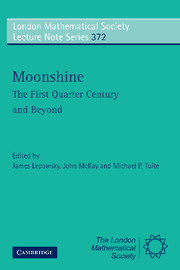 Moonshine - The First Quarter Century and Beyond
Moonshine - The First Quarter Century and Beyond Published online by Cambridge University Press: 06 July 2010
Abstract
Moonshine relates three fundamental mathematical objects: the Monster sporadic simple group, the modular function j(τ), and the moonshine module vertex operator algebra V♭. Examining the relationship between modular functions and the representation theory of vertex operator algebras reveals rich structure. In particular, C2-cofiniteness (also called Zhu's finiteness condition) implies the existence of finite generating sets and Poincaré-Birkhoff-Witt-like spanning sets for vertex operator algebras and their modules. These spanning sets feature desirable ordering restrictions, e.g., a difference-one condition.
Introduction
The theory of vertex operator algebra blossomed from two major accomplishments: the proof of the McKay-Thompson conjecture by Frenkel, Lepowsky, and Meurman [FLM88] who constructed the Moonshine module V♭ and the proof of the Conway-Norton conjecture by Borcherds [Bor92] using the Moonshine module. These two conjectures make up what is commonly referred to as Monstrous Moonshine, relating the modular function j(τ) and the Monster group by way of a third fundamental mathematical object, the Moonshine module vertex operator algebra V♭. The study of vertex operator algebras continues to reveal relations within mathematics and with physics.
Representation theory is a particularly rich aspect of the theory of vertex operator algebras with fundamental connections to number theory, the theory of simple groups, and string and conformal field theories in physics. A core idea in the representation theory of vertex operator algebras and conformal field theory is “rationality”, a term used in a variety of ways to describe certain desirable properties of a vertex operator algebra and its modules.
To save this book to your Kindle, first ensure [email protected] is added to your Approved Personal Document E-mail List under your Personal Document Settings on the Manage Your Content and Devices page of your Amazon account. Then enter the ‘name’ part of your Kindle email address below. Find out more about saving to your Kindle.
Note you can select to save to either the @free.kindle.com or @kindle.com variations. ‘@free.kindle.com’ emails are free but can only be saved to your device when it is connected to wi-fi. ‘@kindle.com’ emails can be delivered even when you are not connected to wi-fi, but note that service fees apply.
Find out more about the Kindle Personal Document Service.
To save content items to your account, please confirm that you agree to abide by our usage policies. If this is the first time you use this feature, you will be asked to authorise Cambridge Core to connect with your account. Find out more about saving content to Dropbox.
To save content items to your account, please confirm that you agree to abide by our usage policies. If this is the first time you use this feature, you will be asked to authorise Cambridge Core to connect with your account. Find out more about saving content to Google Drive.